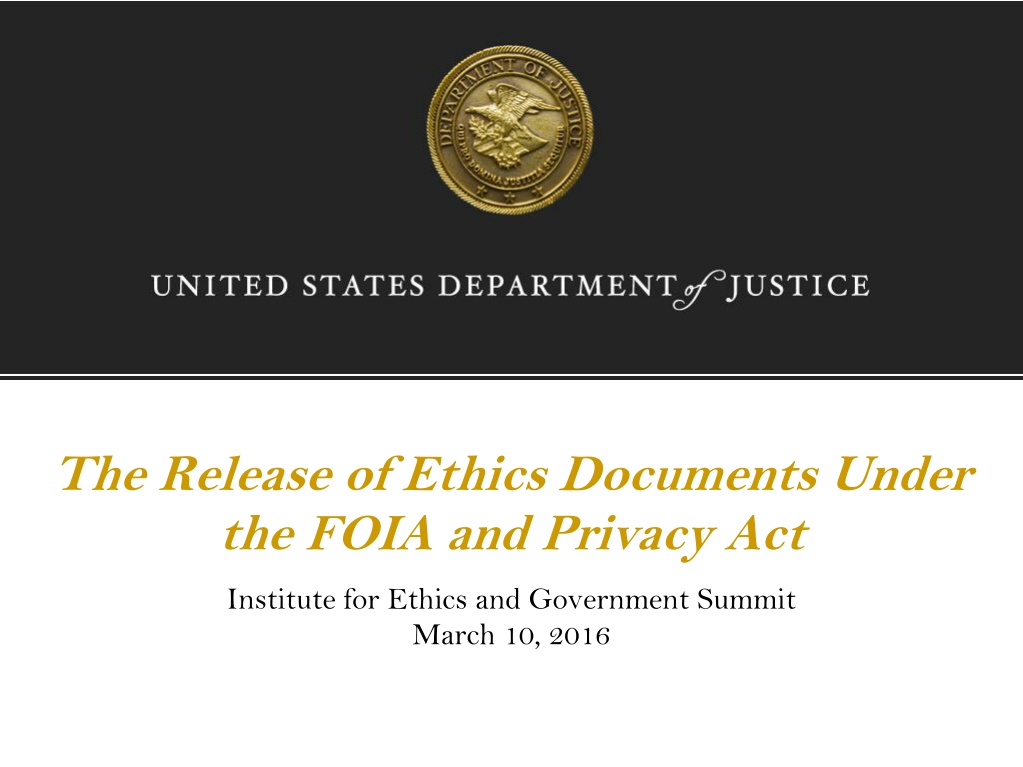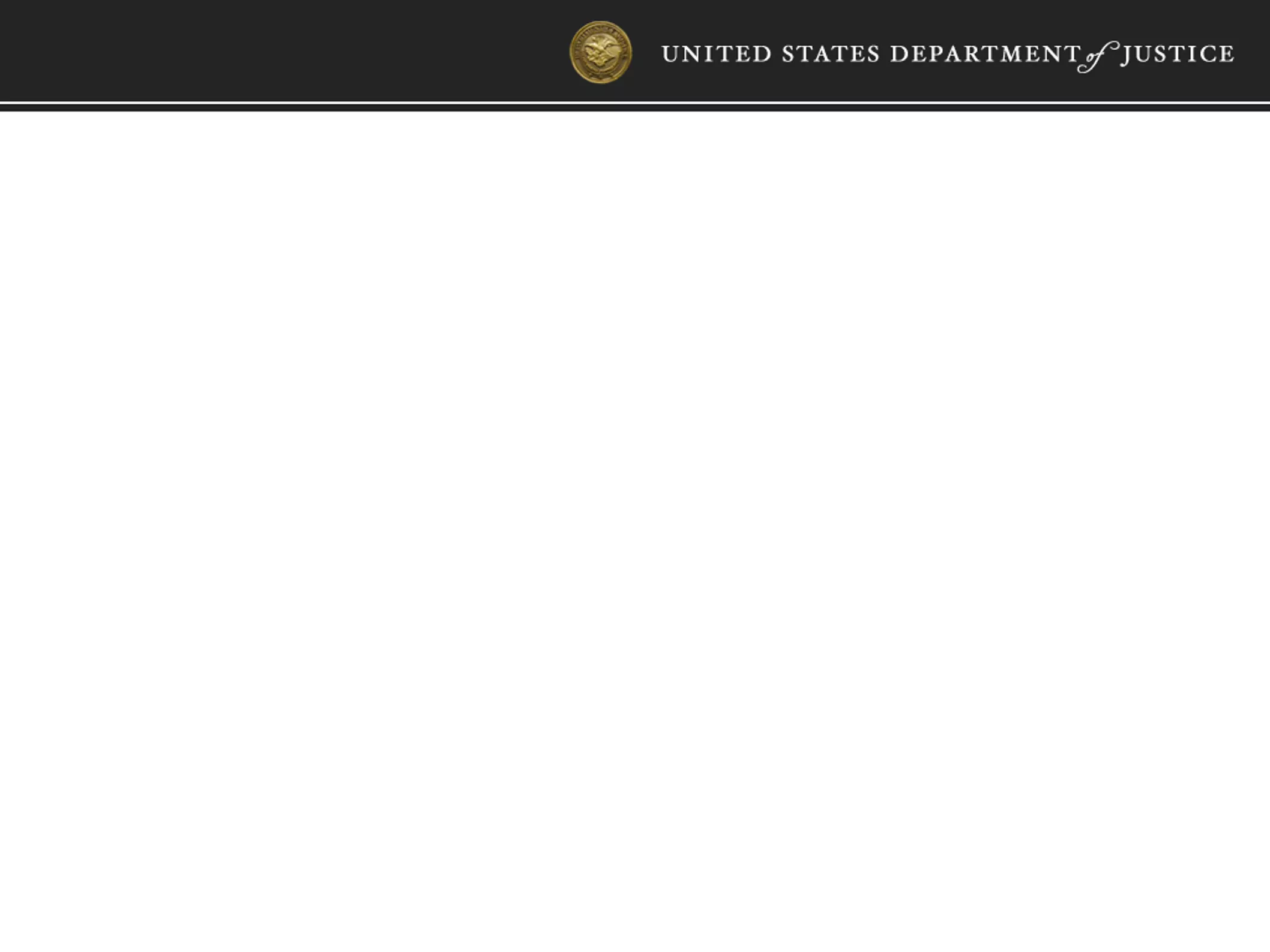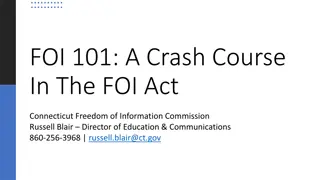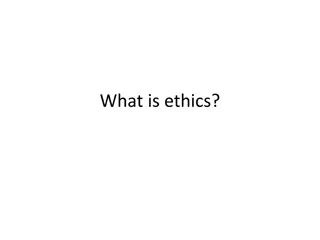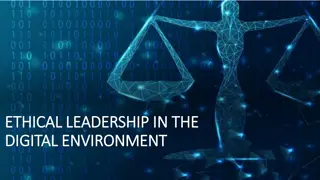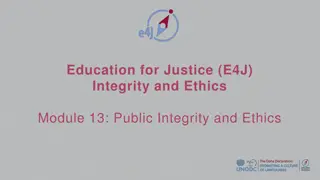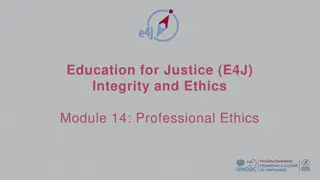Understanding FOIA and Ethics: A Guide
Explore the intersection between the Freedom of Information Act (FOIA) and ethics, including key concepts, exemptions commonly used, and ethics records likely to be requested. Learn how FOIA promotes transparency and accountability in government operations.
Download Presentation

Please find below an Image/Link to download the presentation.
The content on the website is provided AS IS for your information and personal use only. It may not be sold, licensed, or shared on other websites without obtaining consent from the author. Download presentation by click this link. If you encounter any issues during the download, it is possible that the publisher has removed the file from their server.
E N D
Presentation Transcript
The Release of Ethics Documents Under the FOIA and Privacy Act Institute for Ethics and Government Summit March 10, 2016
The Freedom of Information Act The FOIA pertains to federal agency records that exist and can be located in agency files. 2
Freedom of Information United States Supreme Court: The basic purpose of [the Freedom of Information Act] is to ensure an informed citizenry, vital to the functioning of a democratic society, needed to check against corruption and to hold the governors accountable to the governed. 3
FOIA & Ethics: Common Goals On his first full day in office, President Obama established new transparency and ethics rules. Transparency + Ethics = Accountability 4
Applying FOIA to Ethics: FOIA Exemptions Commonly Used for Ethics-Related Documents 5
Commonly cited FOIA Exemptions The most commonly cited FOIA exemptions by agencies government-wide: Exemptions 6/7(C) (personal privacy) Exemption 7(E) (law enforcement techniques & procedures) Exemption 5 (civil discovery privileges) The most commonly cited FOIA exemptions by OGE: Exemption 6 Exemption 5 Exemption 3 (records exempted by statute) 6
Ethics Records Likely to be Requested under FOIA Financial disclosure and related records Ethics advice and counsel Ethics waivers and approvals Ethics training records Ethics reports and questionnaires OGE referrals to the Department of Justice Ethics program management materials Some records are accessible directly through provisions of the Ethics in Government Act of 1978. 7
FOIA Exemption 3: Statutory Prohibitions on Disclosure 8
FOIA Exemption 3 Protects information that has been specifically exempted from disclosure by statute. May be an absolute or limited prohibition on disclosure Any statute enacted after October 28, 2009 must specifically cite to 5 U.S.C. 552(b)(3) to qualify as a withholding statute 9
Applying Exemption 3 to Ethics Records Statutes Found to be Applicable to Ethics Records 5 U.S.C. app 107(a) (confidential financial disclosure reports) Meyerhoff v. EPA, 958 F.2d 1498, 1500-02 (9th Cir. 1992); Seife v. NIH, 874 F. Supp. 2d 248, 254 (S.D.N.Y. 2012); Concepcion v. FBI, 606 F. Supp. 2d 14, 33 (D.D.C. 2009); Glascoe v. DOJ, No. 04-0486, 2005 WL 1139269, at *1 (D.D.C. May 15, 2005) 5 U.S.C. app. 105 has also been cited by OGE 18 U.S.C. 208(d)(1) (conflict of interest waiver determinations) Seife v. NIH, 874 F. Supp. 2d 248, 256 (S.D.N.Y. 2012) 10
FOIA Exemption 5: The Civil Discovery Privileges 11
FOIA Exemption 5 Protects inter-agency or intra- agency memorandums or letters which would not be available by law to a party other than an agency in litigation with the agency. 12
FOIA Exemption 5 Records covered by Exemption 5 are good candidates for discretionary release. 13
Exemption 5 Threshold Threshold: inter-agency or intra-agency memoranda or letters Within or between agencies Consultants 14
The Deliberative Process Privilege The Deliberative Process Privilege a) predecisional b) deliberative c) facts generally not protected 15
Other Civil Discovery Privileges Attorney Work-Product Privilege a) prepared by an attorney or under his/her direction b) in anticipation of litigation c) no temporal limit d) facts protected Attorney-Client Privilege a) communication from client to attorney b) communication confidential 16
Applying Exemption 5 to Ethics Records E-mails, memoranda, recommendations, notes and approvals related to ethics analyses and waiver requests Ethics guidance, opinions, and advice Ethics program and training materials Ethics-related policies Referrals to the Department of Justice 17
FOIA Exemption 6 Protects information in personnel and medical files and similar files when disclosure would constitute a clearly unwarranted invasion of personal privacy. 19
Exemption 6: Threshold Personnel and medical files and similar files Personnel & medical files = easy to identify What s a similar file? Almost anything else qualifies as a similar file. Courts have found that the similar file prong is satisfied where the information pertains to a particular individual. A file can exist in any format. NY Times v. NASA (audio recordings can be similar files). 20
Exemption 6: Privacy Interest Living individuals have a privacy interest in not having agencies disseminate personal information about them. Privacy encompasses an individual s control of information concerning his or her person. Information need not be intimate or embarrassing to qualify for protection. 21
Privacy Interest Privacy interests have been found in personally identifying information such as: a person s name, address, phone number, date of birth, criminal history medical history, and social security number. 22
Privacy Interest Glomar Response When a request seeks records concerning an identifiable individual and the records are of a particularly sensitive nature, it may be necessary to neither confirm nor deny the existence of the records, or Glomarize. Must be a targeted third party request. Cannot acknowledge the very existence of records. May need to bifurcate a request to process it separate third party subjects from other subjects. 23
Privacy Interest of Federal Employees Per OPM regulation, 5 C.F.R. 293.311, agencies should release: Name; Present and past position titles and occupational series; Present and past grades; Present and past annual salary rates performance awards and bonuses; Present and past duty stations; and Position descriptions, job elements; and performance standards. 24
FOIA Public Interest What s a FOIA public interest? It s not necessarily what s of general interest to the public. Disclosure of the information must serve the core purposes of the FOIA, to shed light on an agency s performance of its statutory duties. DOJ v. Reporters Committee. The agency s conduct, not the personal conduct of individuals is relevant. 25
FOIA Public Interest Neither the identity of the requester nor the private need for the information is given any weight in this determination. The public interest must be served by disclosure of the requested information. 26
Balancing the Interests If privacy is not threatened by disclosure, Exemption 6 does not apply. If there is a privacy interest but no countervailing FOIA public interest in disclosure, withhold the record. If there is a privacy interest and a FOIA public interest, balance. 27
Balancing the Interests Factors To Consider In Balancing Information concerning the intimate details of a person s life generally deserve protection. The passage of time usually serves to increase the privacy interest. Agency may consider any adverse consequences disclosure may have on the identified individual. Proven allegations of official misconduct, constitute a significant public interest. Identities of individuals in law enforcement records are virtually never very probative of an agency s behavior or performance. SafeCard Services v. SEC. 1) 2) 3) 4) 5) 28
Balancing the Interests One approach: redact personally identifying information and release remainder This both protects privacy and reveals government activity 29
Applying Exemption 6 to Ethics Records Financial information and business relationships Familial information Home and personal addresses and contact information Social security numbers, dates of birth Gifts and travel information Outside activities Identities of 278 and 450 filers, and individuals receiving training 30
Freedom of Information Act and Privacy Act Interface 31
Purpose of the Privacy Act Protect the privacy of the individuals about whom the government maintains records by: 1. Limiting the collection, maintenance, use, and disclosure of personally identifiable information. 2. Allowing individuals to request access to, amendment of, and an accounting of disclosures concerning records about themselves. General Presumption is Protection 32
Purpose of the FOIA Facilitates government transparency and accountability. Provides a means for the public to know what the government is up to. Permits agencies to protect certain records that fall within any of the nine FOIA exemptions. General Presumption is Disclosure 33
Records Covered Privacy Act FOIA Records must be: 1. About an individual, 2. Stored in a system of records, and 3. Accessed by personal identifier. All agency records. Privacy Act Record = Agency Record Agency Record Privacy Act Record 34
Privacy Act: General Rule Generally, agencies cannot disclose Privacy Act records without the prior written consent of the individual. Records may be disclosed without prior written consent under certain conditions. 35
Privacy Act Conditions of Disclosure All conditions are listed at 5 U.S.C. 552a(b). The most commonly encountered conditions include: (b)(1) Need to know within agency (b)(2) If required under the FOIA (b)(3) Routine use published in SORN 36
Access under Privacy Act and FOIA Both the Privacy Act and FOIA provide rights of access to records. However, there are differences in the extent of access depending on the statute. 37
Who has a right of access? Privacy Act U.S. Citizens Lawful Permanent Residents FOIA U.S. Citizens LPRs Non-U.S. Citizens Organizations ANYONE 38
Privacy Act Exemptions Ten exemptions limit access under the Privacy Act: One special: 552a(d)(5) Agency must publish notice in the Federal Register if they will invoke other exemptions: o Two general: 552a(j)(1)-(2) o Seven specific: 552a(k)(1)-(7) 39
Processing Requests 1st Party Requests Process first under the Privacy Act, then under the FOIA for the greatest disclosure. 3rd Party Requests Process only under FOIA 40
How to Process First Party Requests 1. Does a Privacy Act exemption apply? If no, release. If yes, continue to FOIA analysis. 2. Does a FOIA exemption apply? If no, release. If yes, withhold. Information can only be withheld when both Privacy Act and FOIA exemptions apply. 41
How to Process Third Party Requests Process third party requests for Privacy Act records under the FOIA only. Release records if FOIA requires disclosure (i.e., no FOIA exemption applies). No discretionary release of Privacy Act records. Agency generally needs a FOIA request in hand to release Privacy Act records. Bartel v. FAA, 725 F.2d 1403 (D.C. Cir. 1984). 42
Resources U.S. Department of Justice, Office of Information Policy (OIP): www.justice.gov/oip (202) 514-FOIA (3642) www.foia.gov 43
Questions? 44
Disclosure Under the Ethics in Government Act Jen Matis U.S. Office of Government Ethics
Disclosure Procedure for Public Financial Disclosure Reports Ethics in Government Act (EIGA), 5 U.S.C. app 105(b)(2): [A] report may not be made available ... to any person except upon a written application by such person stating: (A) that person s name, occupation, and address; (B) the name and address of any other person organization on whose behalf the inspection or copy is requested; and (C) that such person is aware of the prohibitions on the obtaining or use of the report. See also 5 CFR 2634.603; OGE/GOVT-1 SORN.
Application for Disclosure (OGE Form 201) EIGA 105(b)(2): Any such application shall be made available to the public throughout the period during which the report is made available to the public. Can also use a Form 201 to obtain completed Form 201s.
6 Year Time Limit EIGA 105(d)(2)(B) Such report shall be made available to the public for a period of 6 years after receipt of the report. -Also must make completed Form 201s available for same time period. EIGA 105(d)(3) After the relevant time period identified under paragraph (2), the report shall be destroyed unless needed in an ongoing investigation. See also 5 CFR 2634.603; General Records Schedule 2.8, Item 061.
6 Year Time Limit Two separate provisions: Requirement to destroy AND limitation on when the report can be made available to the public. Even if the agency hasn t yet complied with the requirement to destroy, it doesn t mean the report should be released.
Fees EIGA 105(b)(1) & 5 CFR 2634.603(e): The agency may require a reasonable fee to recover the cost of reproduction or mailing. A copy may be furnished without charge or at a reduced charge if it is determined that waiver or reduction of the fee is in the public interest. OGE issued a regulation setting its fee for reproduction at $0.15 per page, same as FOIA fees. See 5 CFR part 2604, subpart G.
